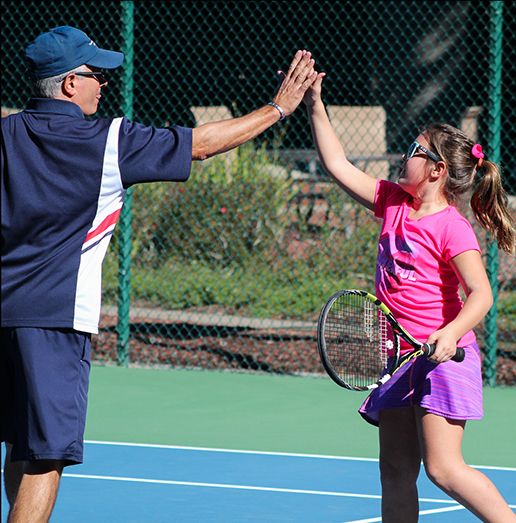Having the right mindset is the number one prerequisite when it comes to learning tennis. This is why parents have such a crucial role in the development of their child's tennis game.
Parents can help their kids in improving their mindsets when faced with adversity, be it in school, home or anywhere. What is really important here is to always ask the child to try his or her best regardless of the outcome.
This is, in my opinion, the number one tip to building the mindset of a champion.
Be it in regular training or competition, Parental support must never be about winning or losing. It must rather be based on seeing their child trying their best.
This effort-driven approach, as opposed to it being result-driven, will help kids remain stress-free and focused on the bits that they can control.
Watching your kids during tennis lessons and reminding them in key moments can also greatly help them solidify this mindset until it becomes second nature.
A few words of encouragement can do wonders and serve as a reminder about what should be the center of their focus during the tennis class.
Activating this process can even start beforehand, as when heading to the tennis academy. Examples such as "It's action time now, I want you to listen carefully to the coach, try your best and have fun".
Anything that will remind the kids that they should focus on trying their best will go a long way in helping them get into the right state of mind prior to the lesson.
Kids, especially of younger age tend to not be able to remember, so regular and consistent encouragements on the way to training are really important and will help with creating a positive psychological pattern in the long run.
Parents can help their kids in improving their mindsets when faced with adversity, be it in school, home or anywhere. What is really important here is to always ask the child to try his or her best regardless of the outcome.
This is, in my opinion, the number one tip to building the mindset of a champion.
Be it in regular training or competition, Parental support must never be about winning or losing. It must rather be based on seeing their child trying their best.
This effort-driven approach, as opposed to it being result-driven, will help kids remain stress-free and focused on the bits that they can control.
Watching your kids during tennis lessons and reminding them in key moments can also greatly help them solidify this mindset until it becomes second nature.
A few words of encouragement can do wonders and serve as a reminder about what should be the center of their focus during the tennis class.
Activating this process can even start beforehand, as when heading to the tennis academy. Examples such as "It's action time now, I want you to listen carefully to the coach, try your best and have fun".
Anything that will remind the kids that they should focus on trying their best will go a long way in helping them get into the right state of mind prior to the lesson.
Kids, especially of younger age tend to not be able to remember, so regular and consistent encouragements on the way to training are really important and will help with creating a positive psychological pattern in the long run.

Similarly, when it's time to compete, parents should uphold the same message and only ask their kids to simply try hard. Never should the word "winning/losing" be brought into the conversation.
Post-match remarks/analysis should be based solely on the child's performance in relation to what he or she has proven to be able to do in training sessions.
As an example, let's say that the child lost a match but played well. In this case, parents must congratulate their child as if he or she has won the match. Something like "I'm so proud of you, you stood tall the whole match and fought tooth and nail for every point" will make the child associate effort with satisfaction.
The other way around is also true: Let's say that the child won the match but played way below their level and capabilities and only won because of opponent's unforced errors. Here, parents ought to spend more time pointing out that he or she could have played much better.
This is the kind of dynamics that will help kids thrive in the long run as they will get used to trying their best and be consistent at it instead of making winning the focal point.
Post-match remarks/analysis should be based solely on the child's performance in relation to what he or she has proven to be able to do in training sessions.
As an example, let's say that the child lost a match but played well. In this case, parents must congratulate their child as if he or she has won the match. Something like "I'm so proud of you, you stood tall the whole match and fought tooth and nail for every point" will make the child associate effort with satisfaction.
The other way around is also true: Let's say that the child won the match but played way below their level and capabilities and only won because of opponent's unforced errors. Here, parents ought to spend more time pointing out that he or she could have played much better.
This is the kind of dynamics that will help kids thrive in the long run as they will get used to trying their best and be consistent at it instead of making winning the focal point.

